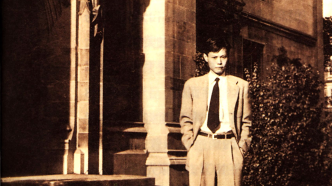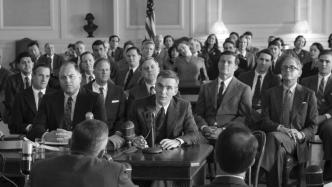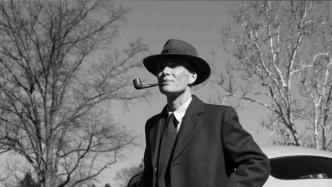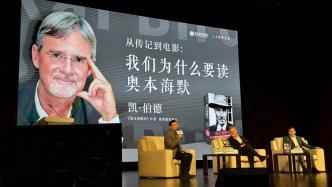
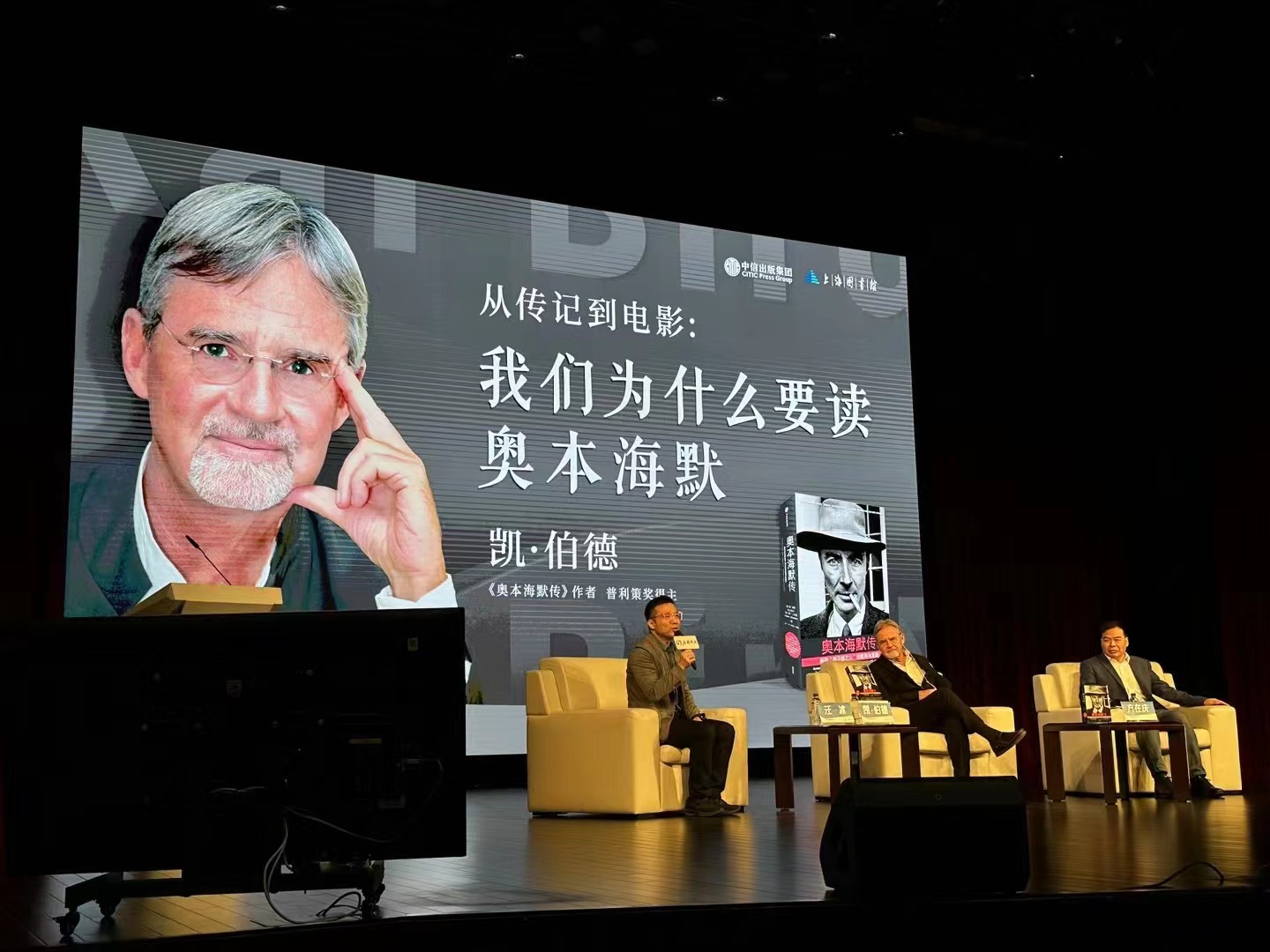
Kay Byrd, one of the authors of "The Biography of Oppenheimer: The Triumph and Tragedy of the American "Father of the Atomic Bomb"", translator of the Chinese version, Wang Bing, Ph.D. in Psychiatry at Peking University, reviewer of the Chinese version, History of Natural Sciences, Chinese Academy of Sciences Fang Zaiqing, a researcher at the institute, held a conversation in the East Branch of Shanghai Library recently. Photo by The Paper reporter Wu Yuewei
The movie "Oppenheimer" directed by Christopher Nolan made related books popular.
Recently, the author of the original work of the film, the translator of the Chinese version, and the reviewer had a conversation in the East Branch of the Shanghai Library. The movie poster picked up at the scene showed that the movie will also be launched on Tencent Video at the end of December 2023.
The original work of the film is "The Biography of Oppenheimer: The Triumph and Tragedy of the American "Father of the Atomic Bomb"" (hereinafter referred to as "The Biography of Oppenheimer"). The English version of American Prometheus: The Triumph and Tragedy of J.Robert Oppenheimer was published in 2005 and won the Pulitzer Prize for Biography the following year. The biography was completed by American biographer Kai Bird and historian Martin J. Sherwin over a period of 25 years.
In August 2023, CITIC Publishing House published the Chinese version of the book. The translator is Wang Bing, a Ph.D. in mental health from Peking University. The reviewer is Fang Zaiqing, a researcher at the Institute of Natural Science History, Chinese Academy of Sciences.
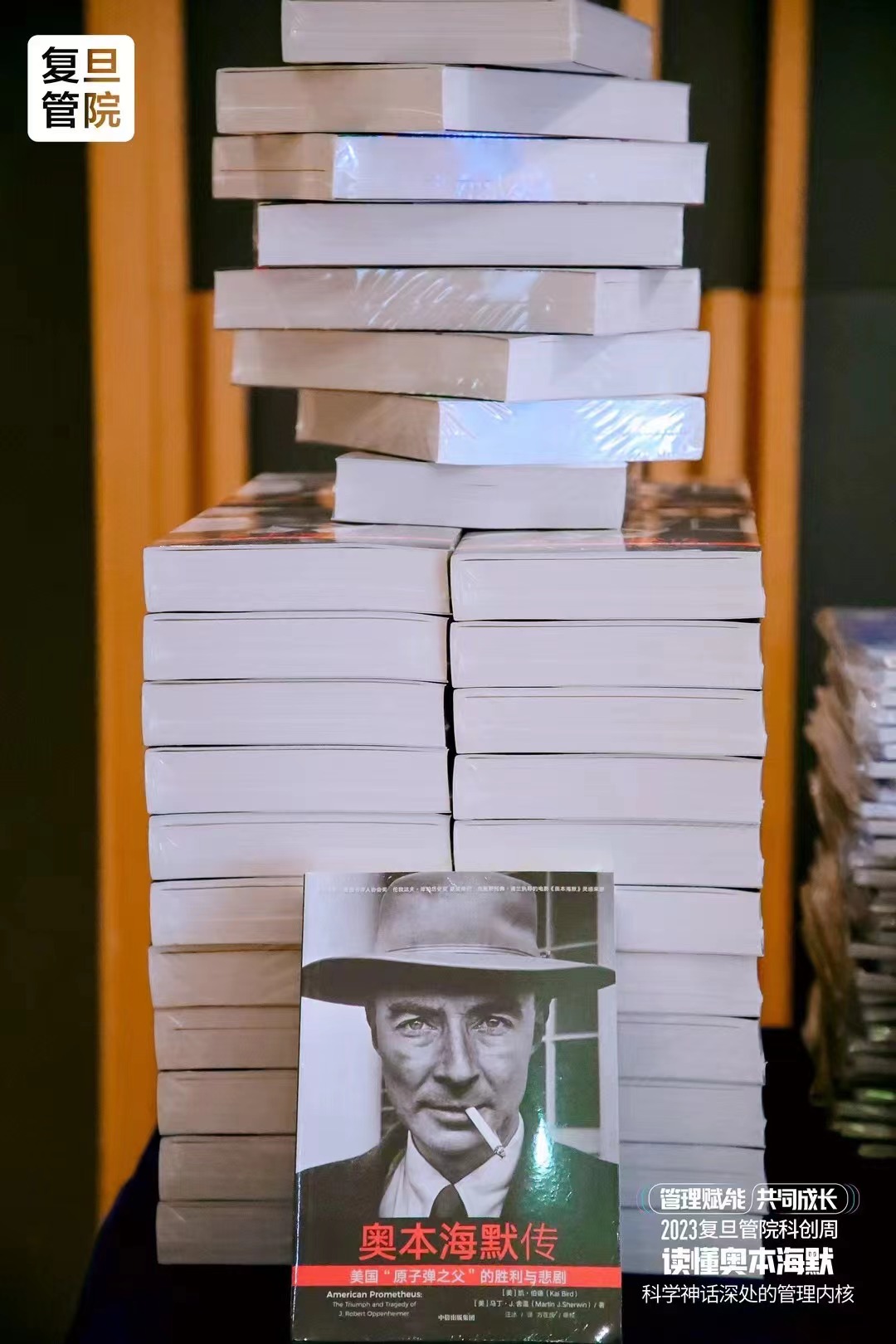
In August 2023, CITIC Publishing House published the Chinese version of "The Biography of Oppenheimer: The Triumph and Tragedy of the American "Father of the Atomic Bomb"".
Another "Oppenheimer moment"
The conversation in the East Branch of Shanghai Library was the third sharing session by Kay Bird to the public in Shanghai within two days. The previous two sessions were held at Fudan University School of Management and Shanghai Zhiwu.
Kay Byrd said Oppenheimer's story is special. In 1945, he became a celebrity and an American hero in the United States. However, nine years later, he was suddenly sent to a secret security hearing for trial. He was humiliated and politically destroyed. The FBI began to monitor Oppenheimer in 1940, observing him very carefully and trying to prove that he was a member of the Communist Party of the United States. But there is no evidence in FBI documents that he joined the Communist Party USA. Although Oppenheimer was attracted to the activities of the American Communist Party, he was "pink," not "red."
Kay Bird believes that scientists should consciously become public intellectuals. Artificial intelligence is a worrying technology. We are clearly on the cusp of another world-changing scientific revolution. This is another "Oppenheimer moment"—a moment when we should stop and think about the consequences of what we're doing. At the same time, I don’t think we can stop the development of science, or we can stop the development of artificial intelligence. We need to think long and hard about: How to regulate this? How to use it to bring about good effects and avoid causing disasters?
vulnerable person
"Fragility" was mentioned more than once by the three guests in their sharing.
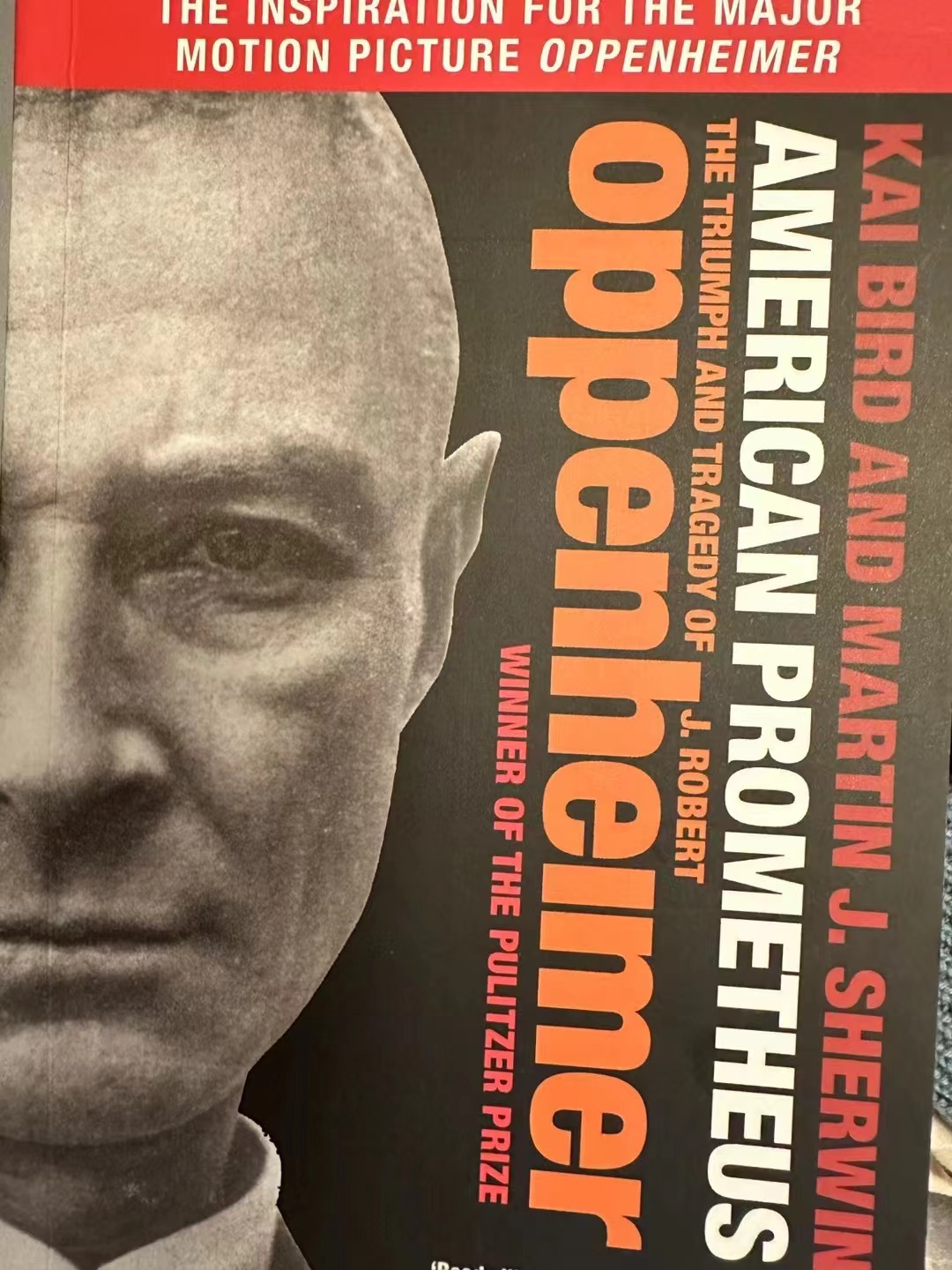
The original work of the movie "Oppenheimer" is "American Prometheus: The Inspiration for the Major Motion" (referred to as "Oppenheimer Biography", American Prometheus: The Inspiration for the Major Motion). The English version was published in 2005.
Kay Bird said that Oppenheimer was a fragile man, but he knew how to use inner strength to overcome the difficulties he faced. His adolescence was long. He was a failure in experimental physics, so he turned to theoretical physics. Oppenheimer was very smart and was able to complete his doctoral thesis in less than a year, get his doctorate, and become a professor of physics at the University of California, Berkeley. But he was a bad teacher at first, he didn't know how to teach and spoke so softly that the students couldn't hear him clearly. Eventually he learned how to teach and became very eloquent. He spoke every word clearly and spoke at length, but without the need for an outline.
Oppenheimer's family was wealthy and he was considered a "noble son". Wang Bing said that Oppenheimer's parents did their best to meet all his growing needs. When his mother was dying, Oppenheimer told his teacher, "I am the loneliest person in the world now." Some people said that he could not even run a hamburger stand, but a fragile and introverted man eventually led mankind's first major scientific project-the huge Manhattan Project.
Fang Zaiqing said that Oppenheimer quickly rose to prominence when he was studying at the University of Göttingen in Germany, "but he was still relatively fragile psychologically." It should be said that the theoretical physicist and mathematician Max Born was very fond of him. The handling was also a psychological blow to him, but this time he stood firm. This is a good transformation process. After experiencing repeated blows and even the darkest moments of his life, Oppenheimer never gave up.
contradictory person
During the conversation, Wang Bing said that on the one hand, Oppenheimer said that he was a destroyer of the world, but on the other hand, he said that he never regretted participating in the research of atomic bombs. This seemed to be contradictory.
Kay Byrd said that Oppenheimer liked to give answers that were very elusive. "The only time he visited Japan in the early 20th century, I think it was 1960, he didn't go to Hiroshima and Nagasaki, so he never saw the devastation caused by the atomic bomb. When he arrived at Tokyo airport, a Japanese reporter asked him ,'Dr. Oppenheimer, do you regret what you did?' Oppenheimer stood there for a while, 'I can only say that my sleep last night was no worse than the night before, nor any worse than the day before. Good evening.' Yes, he never publicly expressed regret for what he had done. But biographers have discovered that his wife Kitty mentioned in a letter to a friend that in August 1945 Hiroshima and Nagasaki When news came that two cities had been bombed with atomic bombs, Oppenheimer fell into a deep depression that she didn't know if he would survive. In other words, he was so depressed that he might take his own life life."
"As a scientist, he knew he had no choice. Scientists will learn that you can't stop science. Humans are very curious animals and will do whatever it takes to figure out the physical world around them. Oppenheimer worried about Germany Scientists would provide Hitler with the bomb, and fascism would win World War II. Yet after the atomic bombings of Hiroshima and Nagasaki, he removed himself from the secret city of Los Alamos to build this 'gadget' man, became a man who went around warning politicians and the American people. He said, 'This is a terrible weapon and we should not rely on it.' When the Soviets detonated their atomic bomb in 1949, this was America caused chaos and people went crazy. 'The answer is, well! We need to build a bigger and better bomb, which is the hydrogen bomb.' Politically speaking, Truman did not want to appear weak and he ignored the Oppenheimer On Merger's suggestion, he authorized the development of the hydrogen bomb. When General Eisenhower became president in 1952, he also authorized the creation of more and larger weapons. He curiously believed that it was a cheap form of defense. Oppenheimer explained to Eisenhower, 'These bombs are not cheap, they are not defensive weapons and they cannot be used rationally on the battlefield. They have no military objectives but are weapons for destroying cities and killing large numbers of civilians concentrated in them.' He wants to ban nuclear bombs, and establishing controls at the international level to ensure that any factories and laboratories could be inspected to ensure that nuclear weapons were not being developed. But no one listened to him. His suggestions were rejected. When he started talking more and more about this topic, In 1954, they hunted him down, knocked him down, and destroyed Oppenheimer as a public intellectual," said Kay Byrd.
Fang Zaiqing said that all our current reconstructions have a particularly obvious process. He felt that part of people's understanding of Oppenheimer was fictional. For example, after the test of the first atomic bomb, Oppenheimer was rumored to have said, "I turned into the Grim Reaper." But in fact, he didn't say this at the time. At that time, he told his brother, "We did it." (We did it.)
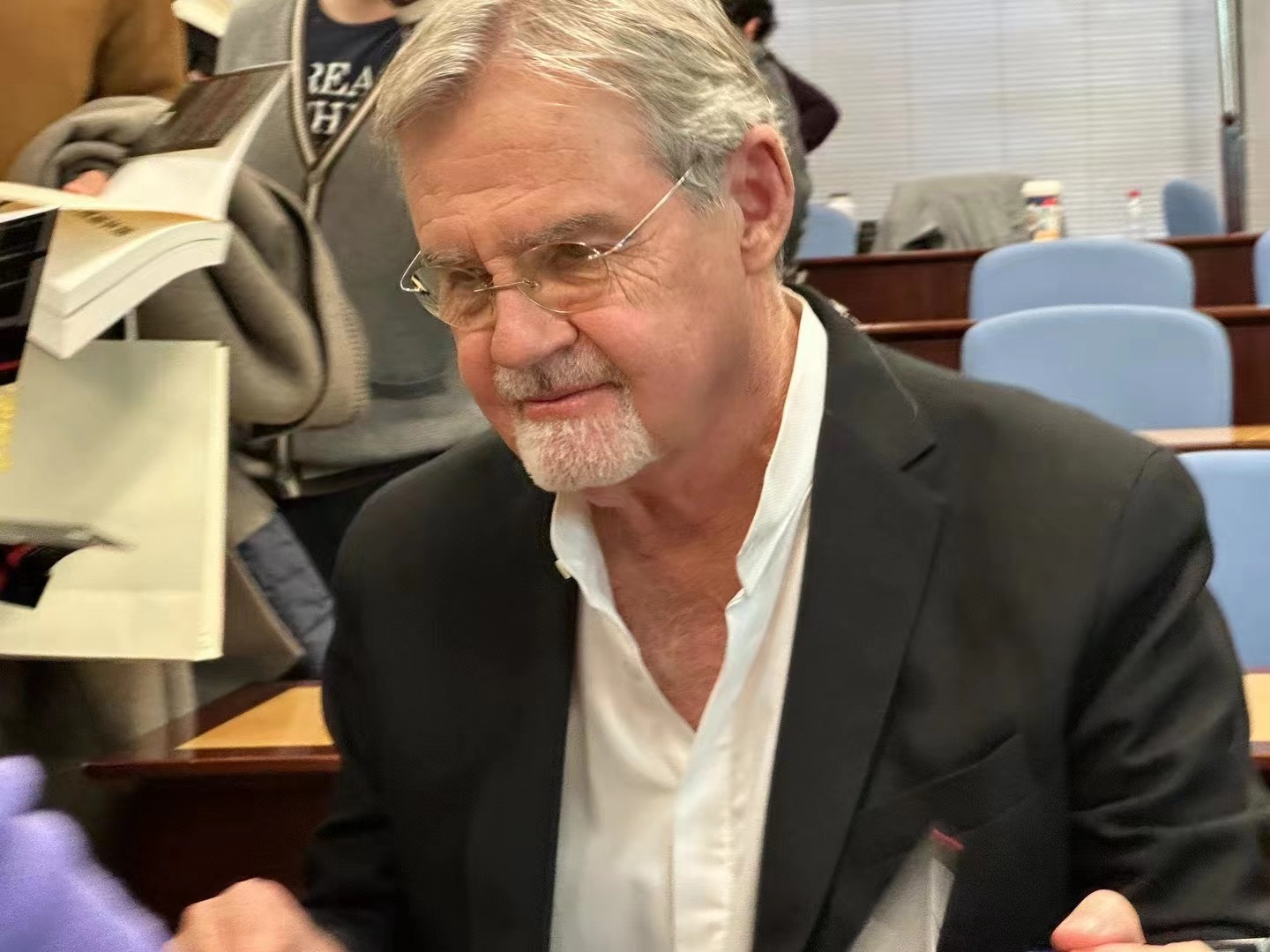
American biographer Kay Byrd, co-author of "The Biography of Oppenheimer: The Triumph and Tragedy of America's "Father of the Atomic Bomb"", signed autographs for readers in Shanghai.
Fang Zaiqing said that in addition, there is another scientist who actually played a very important role, that is (Danish physicist) Niels Bohr. Everything Oppenheimer later did was actually based on what Niels Bohr told him. There are two kinds of competition here. One is that actual politics has become unstoppable. The Cold War happened at that time and the arms race intensified. But most intellectuals, ideally and naively, believe that through their own appeals they can bring this war competition to a halt. But the impact on actual political operations is very small. "In this sense, I think Oppenheimer knew what he couldn't do and did it, which may be more valuable. Because at this time, if intellectuals don't speak out, they will leave it to the words of politicians. It may be more dangerous.”
Cleverness vs Wisdom
Will AI (artificial intelligence) put biographers out of business?
Kay Bird said that they asked ChatGPT to write a biography about Kay Bird. As a result, ChatGPT (automated conversational agent, chatbot) said, "Kay Byrd is an American biographer who teaches at Stanford University." I had gone to Stanford and done some research using their archives, but I had never taught there.
We need AI to generate evidence of what it says. We need footnotes, we need to see the original material. There should be a way for Sam Altman and his colleagues to program the AI to build guardrails. There are a lot of tough problems to solve. I think this is indeed an "Oppenheimer moment": we need to learn from Oppenheimer's lessons and we need more scientists like Oppenheimer to step up and become public intellectuals and talk about the impact of science and technology around us. Political and policy implications, explaining to us the rational choices we face.
Fang Zaiqing said, I am more optimistic. In fact, ChatGPT is not that scary, because it often makes some mistakes, which shows that we humans still have to surpass it in many aspects. It can certainly replace us in some simple procedures. But like the fear that comes with any new technology, these problems can be solved by new technologies. So I'm generally optimistic.
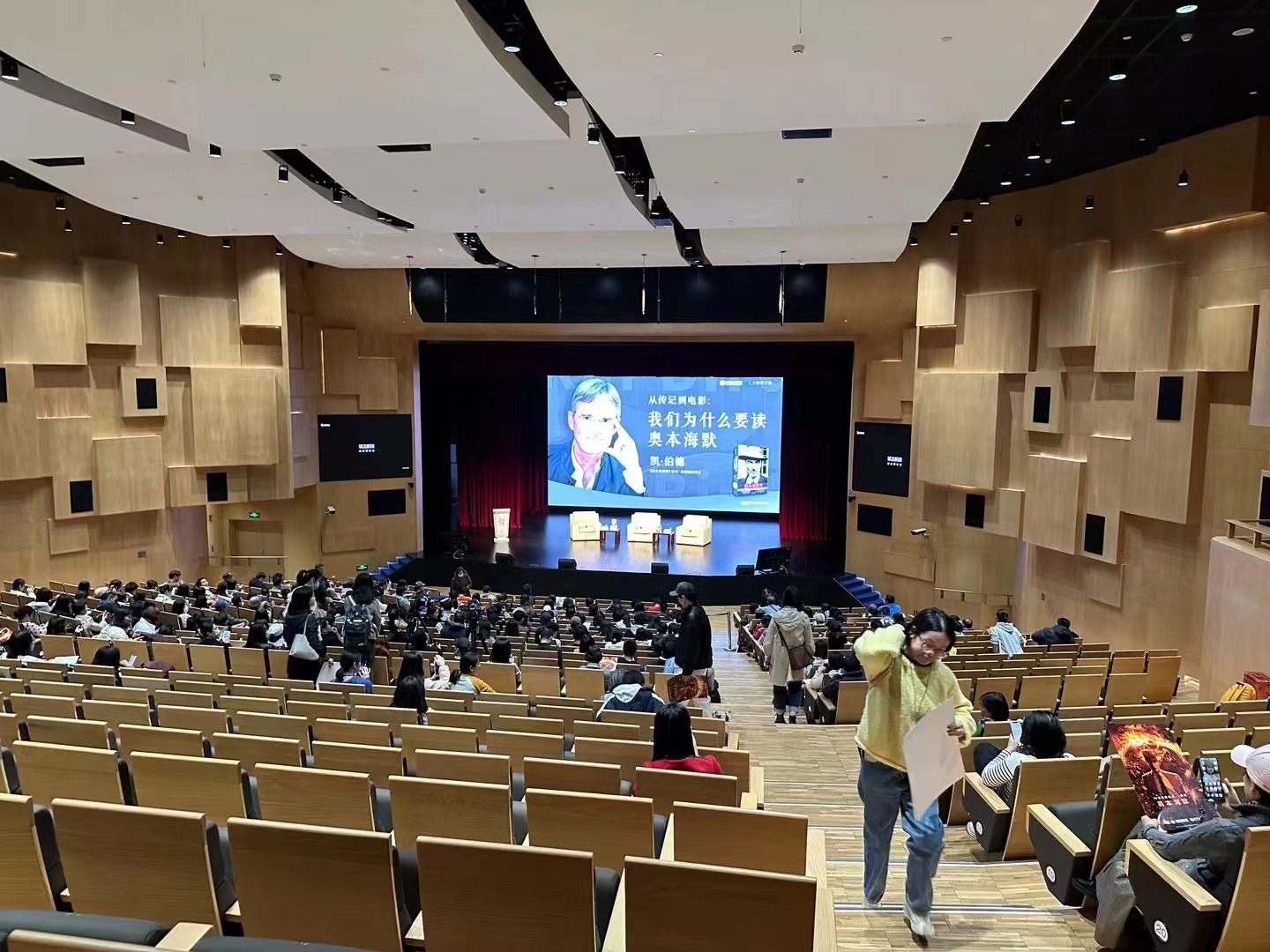
In the East Branch of Shanghai Library, Kay Bird said that artificial intelligence is a worrying technology. We are clearly on the cusp of another world-changing scientific revolution. This is another "Oppenheimer moment"—a moment when we should stop and think about the consequences of what we're doing.
Wang Bing said that one of his most profound feelings after reading this biography is that perhaps the greatest threat to mankind is not nuclear weapons, gene editing, or artificial intelligence, but our wisdom and the power in our hands. the gap between. Are we any wiser than our parents, or the philosophers of 2,000 years ago? No one can be sure of this. There was a detail in the book that particularly touched him: Oppenheimer's teacher wrote to his students that he hoped his students would not be smarter, but wiser. "I thought about it for a long time, what is the difference between intelligence and wisdom? Later I realized a little bit that wisdom is 'finding ways to get it', while wisdom is 'knowing what we will eventually lose'."
